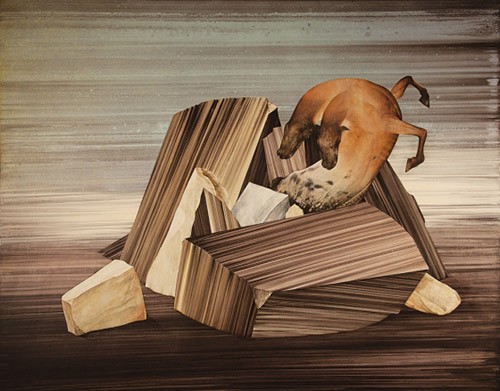Tehran,
No. 26, Golestan Blv., Africa St., Tehran
6 December 2013 - 17 December 2013
Meghdad Lorpour has been quietly and steadfastly working over the past few years. His technique has become rich and intimate and his ideas have synchronized themselves with his solitude. This synchronicity is not an easy feat; searching in solitude can often lead one astray; however, in Meghdad’s case, this solitude has strengthened his brush strokes and poeticized his ideas to reflect fear and melancholy. An owl perched atop a grey forest is the artist who the viewer perceives has been sitting there for years but gone unnoticed by all. A sweet camouflage not of the kind feigned by animals in the jungle or soldiers at war, but one in which the soul succumbs to while waiting. Like when one falls silent and this silence is not a result of the unsaid but of the unimportance of the things, which are being said. Megdad is not interested in discourse maybe because he knows it is too late. Here, to stare is to compose silence and its state is pure. The owl has become one with the jungle and it not being seen is unimportant; the owl has become one with the jungle but it still stares at us; though it is not nighttime, it is still awake. That which is most interesting about Lorpour’s work is that technique, idea and the loneliness of the artist all grow on the same level. Most of the creatures, which Meghdad has created, embody a glorious solitude along with an inevitable fear. A bear standing amid a field knows it is being watched; it is cautious and powerful. Even the hedgehog, which is running, is not doing so out of fear. It is frustrated and is escaping from its exhaustion – something which it has been doing for years, the traces of which still remain on the canvas. Lorpour’s creatures either take refuge in solitude or are accustomed to it. Sometimes as a result of this solitude, they succumb to madness and transform into a sad and perhaps even an epic poem. His creatures are portrayed completely alone unless they are hunters attacking the precious solitude of other animals. As if Meghdad is depicting two situations: one of solitary animals and the other of camouflage or escape. Only in one work is there a sacred cow trapped while in flight; thus Meghdad explores all the possibilities for these creatures while embellishing their solitude. However, that which he prefers is a poetic escape to solitude, remaining there and gradually camouflaging, becoming one and powerful with and in it. Picking at one’s scabs in solitude until one’s existence becomes accustomed to pain and one becomes one with nature, happens in such a way that ones multiple layers become a poem of silence.
Callus \’ka-lƏs\ noun
1: a thickening of or a hard thickened area on skin or bark 2: a mass of exudate and connective tissue that forms around a break in a bone and is converted into bone in healing 3: soft tissue that forms over a wounded or cut plant surface (Webster’s dictionary)
Callus \’ka-lƏs\ noun
1: a thickening of or a hard thickened area on skin or bark 2: a mass of exudate and connective tissue that forms around a break in a bone and is converted into bone in healing 3: soft tissue that forms over a wounded or cut plant surface (Webster’s dictionary)
